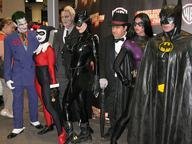Quiz Answer Key and Fun Facts
1. The title "PhD Comics" immediately brings scholarship to mind: a Doctorate of Philosophy (PhD) is, after all, one of the highest academic honors a person can earn. In the case of this comic strip, however, the initials refer to something a little more down to earth. What does "PhD" stand for in "PhD Comics"?
2. Although the strip treats experiences common to pretty much every graduate school everywhere, it's set at a particular real-life university with an excellent reputation. What is this institution of higher learning, which inexplicably gave author Jorge Cham a degree even after years of being lampooned in his comic strip?
3. From the very beginning, a core cast of characters has populated the strip. The most visible character is also the hardest to describe, simply because his name is never given. Portrayed in a constant state of dishevelment and near-panic, he is often thought to stand in for the author, and the strip begins with his arrival at graduate school. For whom does this nameless young man work?
4. Another major character works in the same lab as the nameless grad student. No one knows how long he's been in graduate school; in fact, there are rumors that the younger students were in kindergarten when he began. Almost as much of an institution as the university itself, he raises procrastination to an art form -- but fatherhood finally forces him to take graduation as a serious goal. What is the first name of this lazy legend?
5. Another character, arguably the one with the biggest (and loudest!) fan base, is a female engineering student in a very, very male department. Many strips deal with her resulting ambivalence; in one, she wears a (false) T-shirt reading "I have a boyfriend" in order to stave off ardent admirers. Who is this smart, hardworking, but conflicted woman?
6. Rounding out the central four characters is a token social-sciences grad student, a foreign national who is quick to join peaceful protests (especially in support of her beloved Apple computers). Who is this character, an anthropology student who is much more connected to the real world than her peers in the strip?
7. Our nameless hero has a younger sister, who -- despite the example set by her brother -- seems to be considering attending graduate school. A number of jokes hinge on her poorly researched efforts in this direction, from her casual cell phone conversations during important exams to her arrival at the Graduate Record Exam (GRE) prepared for a format that hasn't been offered for years. What is her name?
8. The lives of the "PhD Comics" characters are defined by many desires. There's the search for good data, leading to publications, and maybe -- just maybe! -- the approval of one's adviser. There's the quest for a thesis topic and for sources of funding. But it is in pursuit of what non-academic item that the characters -- especially the older ones -- find the most satisfaction?
9. Near the end of the second volume, the slackerly senior graduate student -- spurred by his love for his wife Jen and his sense of duty toward his coming child -- finally ends up defending his thesis. Is his defense successful?
10. I've really been putting off writing this question -- "save it for a rainy day," that's my motto. The characters of "PhD Comics" would sympathize with this impulse, since they deal with it themselves in practically every strip. In fact, author Jorge Cham toured colleges around the USA with a talk on "The Power of" this concept, the deferral of an action until the last possible moment. What is this word, important to the lives of students everywhere?
Source: Author
CellarDoor
This quiz was reviewed by FunTrivia editor
JuniorTheJaws before going online.
Any errors found in FunTrivia content are routinely corrected through our feedback system.
